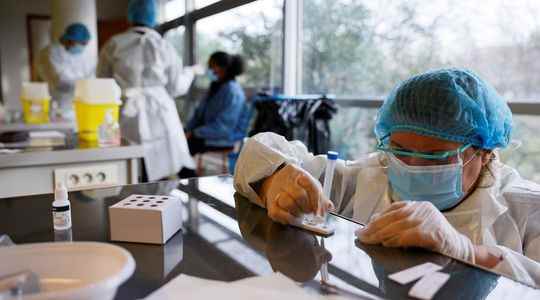“It started like a big crash,” Anna recalls. On June 17, and for the first time since the start of the Covid-19 pandemic, the antigen test of this thirty-year-old Parisian came back positive. And despite the three doses of vaccine, she remembers a particularly difficult moment: “I was surprised by the intensity”. For five days, she fights against “powerful symptoms”. Before detailing: “I had headaches, fever and cough, and especially extreme fatigue like at the end of pregnancy”, she confides. A week later, Anna is cured, but the Covid is not quite behind her: she is still suffering from general exhaustion and a persistent cold.
Anna’s case is not isolated. Like everywhere in Europe, France is now facing a seventh wave of Covid-19 contamination. Driven by a drop in barrier gestures and the erosion of immunity, BA.5, a new variant of Omicron took hold before quickly becoming the majority among new infections. On June 24, France had more than 54,000 daily cases and is now returning to the figures of previous waves. If the translation in terms of hospitalizations remains weak, patients, like doctors, seem to describe a particularly “robust” virus.
The duration of the signs is longer
“He hits hard”, indeed notes Agnès Giannotti, the president of the union of general practitioners MG France, who notes that “the patients have carabine fevers”. “The symptoms are particularly marked and even in those who are already vaccinated and young”, abounds Gilles Bonnefond of the Union of Unions of Community Pharmacists. According to him, people come to the pharmacy with “high fever, cough, sore throat a little stronger than what we have known since January, and they are more tired”. This feeling from the field seems to be observed in the data collected by Santé Publique France (SPF). In a document dated June 15, the health agency notes a difference in the frequency of symptoms experienced in individuals infected with BA.4 and BA.5 and those affected by BA.1, one of the first sub-variants of Omicron. “The cases of BA.4 and BA.5 presented more frequently than the cases of BA.1 a runny nose, nausea / vomiting”, or even loss of taste and smell. In addition “the median duration of the signs was seven days, which is longer than for the cases of BA.1”, underlines the agency.
Would this descendant of the Omicron family be more violent for the organism? What is known is that it has superior abilities to bypass previous immune defenses. “We know that it is around 10% more transmissible than the BA.2 sub-variant which caused the rise in cases in January”, underlines Olivier Schwartz, director of the Virus and Immunity unit at the Institut Pasteur. According to some studies, this virus may have an advantage over previous subvariants in replicating in lung cells. A Japanese study (not peer-reviewed), which was interested in the replication potential of BA.5 in hamster lung cells, thus underlines that the virus could be more virulent than its previous BA.2, in this specific scientific context. . “A simplistic guess, without conclusive evidence, would be that SARS-CoV-2 evolves by attenuating its pathogenicity. But our observations strongly show that (this virus) does not necessarily evolve in such a way as to attenuate its pathogenicity.”
“What doesn’t kill doesn’t make you stronger”
However, on the human it is still difficult to affirm that the symptoms are stronger because of the intrinsic properties of BA.5. “These results have been demonstrated in animal models, work on humans is still confined to a very small number of cases, and it is very premature to draw conclusions on increased pathogenicity”, tempers Olivier Schwartz.
To explain this virulence, the hypotheses therefore remain open. The decline in immunity conferred by the vaccine could be a lead as the last injections begin to date from several months for many French people. But the researchers also wonder if the potency of the symptoms experienced by the patients could be due to past infection with SARS-Cov-2. “Unfortunately what emerges from recent work is that multiple reinfections add up in terms of effect and we have worsening symptoms and pathology, particularly for the increase in the incidence of long Covid and hospitalizations”, underlines Bruno Canard, virologist and research director at the CNRS and specialist in these viruses. In summary, the researcher evokes a possibility: “The saying ‘everything that does not kill makes you stronger’ is faulted, the virus does not kill but does not make you stronger”.
To know precisely whether the specificities of BA.5 cause more “aggressive” infections, it would be necessary to be able to carry out in-depth studies on patients only infected with this sub-variant, in order to compare them to people infected only with BA.2. “But for the moment we do not have the answers”, underlines Bruno Canard, who advises to closely monitor this newcomer to determine the possible long-term effects.
